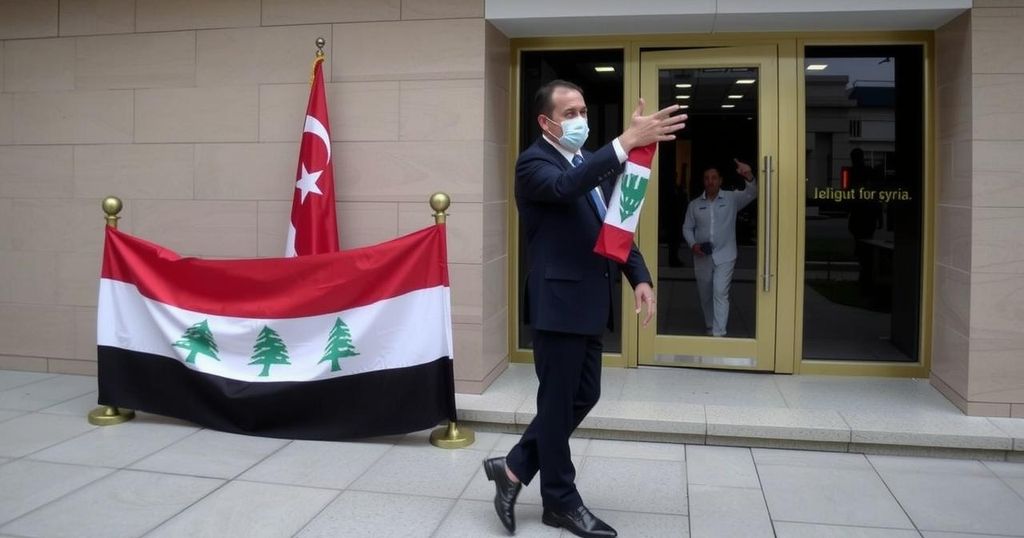Global news
’ AB ELSHAMY, AB ELSHAMY, ABU MOHAMMED AL - GOLANI, AHMAD AL - SHARAA, ASIA, ASSAD, BASHA, BASHAR ASSAD, BEIRUT, CEASEFIRE, CIVILIAN CASUALTIES, CONFLICT, DAMASCUS, DRONE STRIKES, LEBANON, MIDDLE EAST, MO, MOSA ’ AB ELSHAMY, NORTH AMERICA, OMAR SANADIKI, SYRIA, UMAYYAD SQUARE, UNITED STATES, WAL, WALID ELLAFI, WAR
Marcus Li
0 Comments
Syria’s Embassy in Lebanon Suspends Services Amid Transitional Tensions
Syria’s embassy in Lebanon has suspended services following the arrest of relatives of Bashar Assad using forged passports. In parallel, Lebanese authorities have handed over dozens of Syrians, including defectors, to Syria’s new government led by HTS, amid escalating tensions and international diplomatic engagements. Social movements advocating for women’s rights have emerged in response to the evolving political landscape in Syria.
On December 28, 2024, Syria’s embassy in Lebanon announced the suspension of consular services following the arrest of two relatives connected to the ousted President Bashar Assad at Beirut’s airport, allegedly for using forged passports. Concurrently, Lebanese authorities transferred approximately 70 Syrians, including defectors from Assad’s army, to Syria’s new regime led by Hayat Tahrir al-Sham (HTS). This action occurred amid rising tensions as HTS recently took power in Syria, replacing Assad’s government with an administration that has attempted to quell fears of retribution against Assad’s supporters.
The embassy’s declaration on social media indicated that services would remain suspended “until further notice,” without providing a specific reason. Reports suggest that the decision was related to the passports of Assad’s relatives being suspected of having been counterfeited at the embassy itself. In a notable juxtaposition, Rifaat Assad, a major figure related to the former president, successfully departed the region using a legitimate passport just before the arrests.
Further complicating the situation, HTS has launched operations to apprehend individuals formerly allied with Assad’s regime, including setting up security checkpoints in regions heavily populated by Alawite communities linked to the previous government. Despite initial hopes for a more moderate governance style under HTS leaders such as Ahmad al-Sharaa, sporadic clashes have erupted with pro-Assad factions, reflecting the ongoing volatility in Syria.
With regards to international dynamics, regional players like Libya and Bahrain are initiating diplomatic engagements with Syria’s new leaders. The U.S. State Department has reiterated its commitment to support a political process led by Syrians that ensures human rights and inclusivity, following conversations between Secretary Antony Blinken and Turkish Foreign Minister Hakan Fidan regarding developments in Syria.
Amid these political shifts, protests led by women’s groups have emerged, specifically in Northeastern Syria, demanding rights and representation in the new governmental structure. Participants have expressed concerns over the ideology reportedly influencing the new administration, stating that it could undermine the gains made in women’s rights during the previous regime. Activists argue for the essential inclusion of women in the anticipated constitutional framework for Syria, advocating for political visibility in the new order.
As the new Syrian government progresses amid these complex challenges, the trajectory of both regional stability and the role of minorities and women in governance remains uncertain.
The article addresses the recent suspension of services at Syria’s embassy in Lebanon, notably linked to the arrest of Bashar Assad’s relatives found with counterfeit identification. This incident occurred parallel to the handover of several Syrians, including former army officers, to the new regime in Syria, led by HTS, as tensions persist between pro-Assad and opposition factions. Furthermore, the article explores how regional countries seek to engage with Syria’s new leadership and highlights existing social movements advocating for women’s rights in the evolving political landscape of Syria.
In conclusion, the suspension of consular services at Syria’s embassy in Lebanon underscores the precarious nature of governance following regime changes in Syria. The apprehension of Assad’s relatives and the handover of former officers to HTS reflect not only the shifting power dynamics in Syria but also the complexities involved as various factions navigate their newfound positions. Moreover, emerging protests indicate a demand for inclusive governance as Syria’s new leadership works to establish authority amidst ongoing conflict and societal change.
Original Source: apnews.com




Post Comment